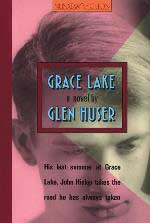Grace Lake – Discussion Questions
Books | About the Book | Synopsis | Questions & Activities
1. Grace Lake is a novel in which setting is carefully detailed. How does the author use irony to play against the idyllic rural summer we might expect from a pastoral setting at a lakeside during a vacation?
2. Although the time setting is not specified, it is apparent that Grace Lake is set in the past. Possibly the late 1950s, early 1960s? Are the characters locked into this time period – or might they as easily exist in a contemporary setting? Is John Hislop’s denial of his sexuality something that would be credible today? How would the preoccupations of the boy campers translate into modern terms?
3. Grace Lake provides us with narrative territory rich with imagery. The imagery of water and flowers are especially dominant. How do these work symbolically within the book?
4. Biblical allusions also figure in the narrative. What are the particular Biblical references that surface – and why do you think the author chose these to weave into the story?
5. Most novels are built around the impact characters have on a central figure or figures. As we catch glimpses of John Hislop’s early life, what characters have impacted him? In what way? Compare and contrast the impact of these characters with those in the contemporary part of the book?
6. Rituals also have a part to play in the narrative. Do the rituals in the camp underscore themes in the novel? Does Hislop himself display ritualistic behavior? What does this tell us about his character?
7. Grace Lake developed from a one-act play, The Flowers of Alberta. What does the novel form offer us that we wouldn’t be able to get in a play? Are there strengths that a play might have over the novel? Why do you think the title was changed?
8. The book begins with a journey – John Hislop’s trip by car to the Grace Lake Camp – and ends with a journey – the rushed night ride to get him, following his second heart attack, to his home-town hospital. In what way do these physical journeys serve the story in between? How does Hislop’s personal journey in the narrative connect to the T.S. Eliot quote at the beginning of the novel?:
We shall not cease from exploration
And the end of all our exploring
Will be to arrive where we started
And know the place for the first time.

